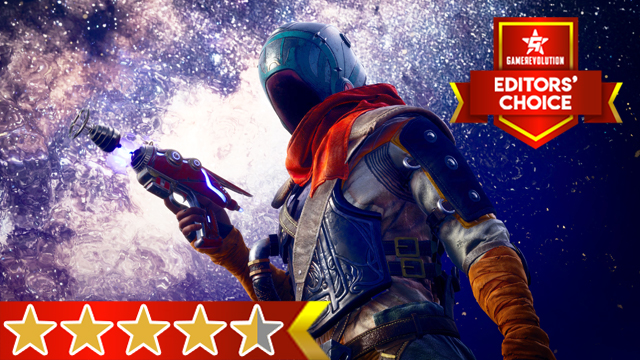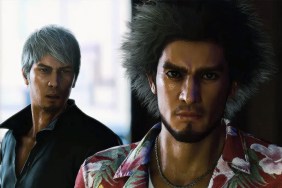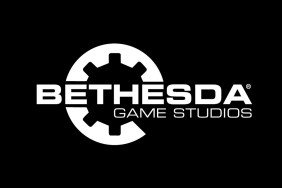It’s impossible to discuss The Outer Worlds without mentioning Fallout. It touches every cornerstone of a Fallout game, from the camera zooming in on an NPC’s face when you strike up a conversation with them, through to enemies crumpling up in an awkward pile of physics when you kill them with a critical shot. Developer Obsidian isn’t exactly shy of its influence. However, branding The Outer Worlds as “Fallout, but in space” would be doing a disservice to what the studio has achieved here; if The Outer Worlds were a Fallout game, it’d arguably be the best Fallout game ever.
The comparisons between The Outer Worlds and Bethesda’s post-apocalyptic series are immediate and obvious. It’s a first-person, open-world action RPG set in a struggling star system filled with morally dubious characters who can be attacked, bartered with, and befriended. Players are aided in combat by Tactical Time Dilation, which allows them to slow time in order to land critical shots with greater ease. Quests can have multiple outcomes and will force you to make tough decisions, such as whether to divert power to an established community struggling with plague and famine, or divert it to a thriving band of deserters. It shares more in common with New Vegas than Fallout 3 or 4, which is understandable considering Obsidian developed the 2010 spin-off. Its utilization of an overarching faction reputation system also contributes to it feeling more like a New Vegas spiritual successor than a sci-fi Fallout 5.
But while Bethesda may have fallen into the deep end after fundamentally misunderstanding its audience with Fallout 76, The Outer Worlds takes what that audience loves and expands on it. The end result is a sprawling adventure that feels like it could have been published by Bethesda, while also outright removing many of the flaws and mistakes of its source of inspiration. It’s well-polished, ambitious, and boasts a gripping central story that continues to ramp up the stakes until its satisfying conclusion.
The Outer Worlds Review | Don’t lose Hope
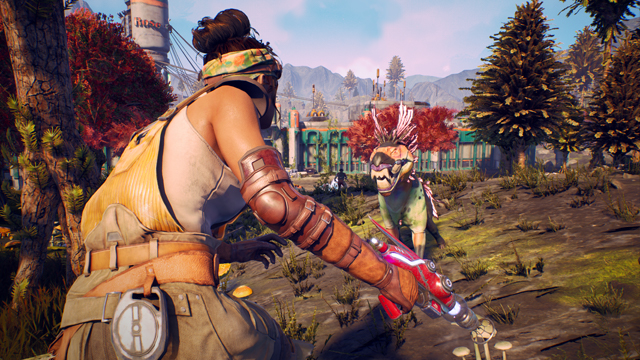
The Outer Worlds places you in the player-created shoes of a survivor of the Hope, a colony ship that seemingly disappeared without a trace after being sent to help colonize the Halcyon star system. You’re rescued by the eccentric Phineas Wells, a rogue scientist on the run from the sinister Board, the entity which controls all of Halcyon. Waking up from a deep cryosleep, you must go in search of more information about the Board, the Hope, and the future of the Halcyon system.
You navigate the system in your ship, the charmingly titled ‘The Unreliable,’ previously owned by the AWOL Captain Hawthorne. The Captain is AWOL because your escape pod crashed on top of him and killed him in The Outer Worlds‘ opening scenes, but you now have the added bonus of assuming his identity whenever anyone asks you for ID. Or you can play it straight and give them the truth. Or you can attack them and make them wish they never asked you in the first place. The star system is your oyster in The Outer Worlds, and there are multiple ways to solve each problem it presents.
The Outer Worlds Review | Karma police
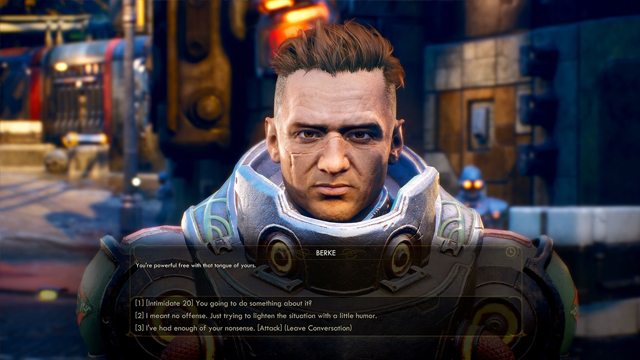
There’s no all-encompassing karma system, with your choices instead affecting your reputation with each faction you encounter. Keep working in favor of one faction and they’ll grow to revere you, but if it’s to the detriment of another faction they’ll eventually learn to despise you and attack you on sight. Across both its main and side quests, you’ll be faced with numerous tough moral decisions to make, and rarely does the decision feel clear-cut good or evil. In my second playthrough, I attempted to play as selfishly as possible, but the dialogue is so engrossing and the characters so sympathetic and well-acted that I found it genuinely difficult to detach myself from its story to do so.
In certain quests, you’ll find yourself faced with a decision that will have devastating ramifications on one community but greatly benefit the other. However, even in those quests, there are smaller choices you can make leading up to this decision that might help you reach an amicable conclusion. There’s also the possibility that you’ll play your cards wrong and botch the quest altogether, preventing you from completing it in the process. While there’s no right or wrong way to complete a quest, there are certainly more satisfying outcomes. These are typically achieved with more legwork, whether that be completing the optional quests included in a certain objective, or talking to involved parties who may offer you additional helpful information.
Due to Obsidian presenting players with very few instances of good vs. bad, there’s a distinct lack of a primary antagonist. You meet characters that get on your bad side, and you know that the Board isn’t to be trusted, but for much of the game your player-character is without an arch-nemesis. This works when it comes to dealing with the conflicts of the planets you visit, but not when it comes to tackling the overarching threat of the Board.
The Board is a mostly silent oppressor, with its stranglehold on Halcyon initially being explained to you in conversation with its dissatisfied colonists. You know that it’s the puppeteer of the system that seems to be asleep at the wheel, with various communities in its regime struggling for survival while its members seemingly thrive. It’s a story about the evils of the sci-fi one-percenters, though given The Outer Worlds‘ penchant for exploring the moral grey areas rather than the black and whites, its message isn’t as simple as “capitalism bad.” Making the “right” decision in the game usually isn’t as simple as outright siding with the dissenters, even though it’s clear from your surroundings that the Board’s methods aren’t working as well as they’d like you to believe.
The Outer Worlds Review | Why the ’50s?
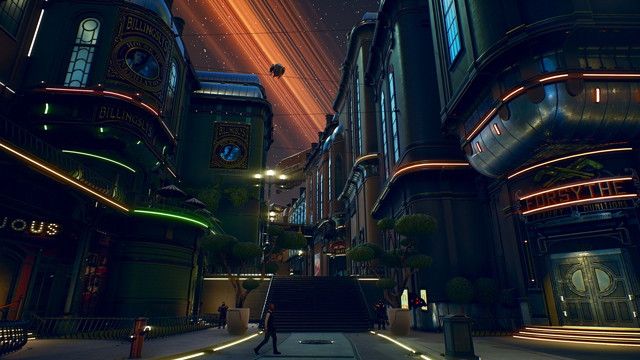
The Outer Worlds is set in an alternate future where President William McKinley wasn’t assassinated, allowing him to serve his full second term and continue his support of big business. This leads to the 23rd century being dominated by megacorporations, who have ventured far beyond Earth and now govern the alien planets they’ve colonized. The exact timeframe of all this space travel and terraforming is muddled; each planet retains the same retrofuturistic aesthetic, coupling space marine armor and science weapons with 1950s-era posters and saloons.
While these inconsistencies can certainly be ignored, it doesn’t give The Outer Worlds its own visual identity. Perhaps this was a conscious decision to lure in the Fallout fans, but even transporting another era into space like the ’70s or ’80s would have been preferable. Instead, its ramshackle buildings and the fashion sense of those living in them feels derivative. If ‘I Don’t Want to Set the World on Fire’ started playing on my ship’s speakers, I wouldn’t have second-guessed it.
Fortunately, the planets themselves look gorgeous. Their pastel color palette is reminiscent of No Man’s Sky, while their skyboxes are filled with the nearby planets you can see on your ship’s navigation system. Looking up in the sky and being curious about a distant planet, then being able to travel over to it later, makes the game’s series of relatively small open-world environments feel massive. While they aren’t exactly busy outside of their designated communities — don’t expect many random quests to pop up while you’re out exploring — there’s a fast travel system that eradicates all of the unnecessary wandering you’d otherwise have to do. This ensures that hopping between objectives is never laborious, and most exploring you do is out of choice, not necessity.
I was also taken aback by how few glitches I encountered during my playthroughs, considering that Obsidian’s last crack at the Fallout whip was the infamously buggy New Vegas. Aside from a smattering of physics-related problems after killing enemies in firefights, not one notable issue in this department crept in during my 40+ hours with the game. While it may be capped at 30 FPS on PS4 Pro, I never experienced any noticeable dips, and everything ran smoothly from beginning to end.
The Outer Worlds Review | Bullet time
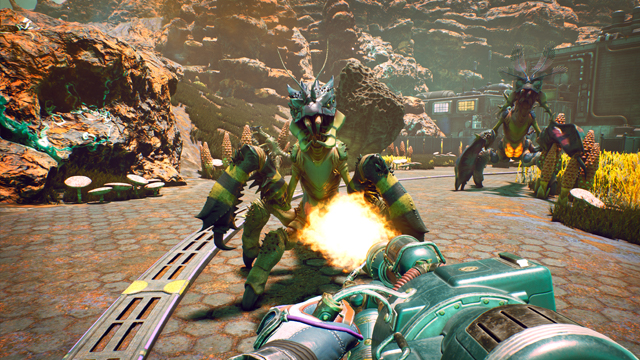
Combat isn’t the most interesting aspect of The Outer Worlds on the surface, though remains consistently exciting throughout. By providing its own spin on VATs with Tactical Time Dilation, you’re granted the opportunity to systematically take down enemies in fun and gruesome firefights. TTD allows you to slow down time and aim your shots better, along with displaying information on-screen indicating what each shot will do. If you aim for the eyes, you can disorientate your attacker, or aiming for their weak point might land a critical hit and bring them to their knees. Entering into pseudo-bullet time and slow-mo shooting at a giant mantiqueen’s belly retains the pace of the action, unlike VATs pulling you out into a boring menu, while also allowing you to deal out massive damage while feeling like a hugely overpowered gunslinger.
Melee weapons don’t fare as well as ranged weapons, with close-quarters combat being trickier to handle in first-person and many tougher enemies dealing massive damage when up close. However, particularly in the late game, you eventually get access to some monstrously overpowered equipment that’s a blast to use. There are more than a few guns and melee weapons tucked into The Outer Worlds which dramatically turn the tide in your favor, and while it doesn’t threaten Borderlands 3‘s zany arsenal of firearms, they still pack an almighty punch.
The Outer Worlds Review | Friends in need
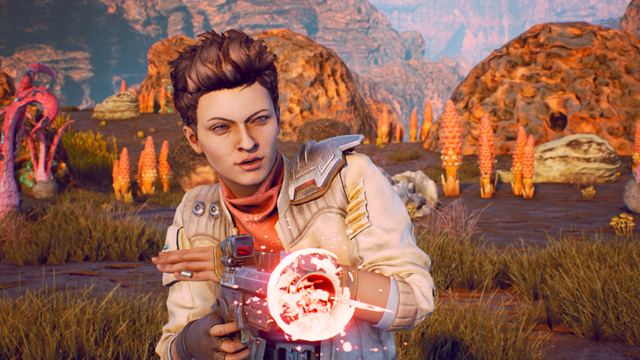
Despite bringing the ’50s to space, The Outer Worlds left behind its social politics. The companions you can recruit throughout your journey are a diverse group, ranging from Max, the hilariously embittered vicar, through to Nyoka, a drunk big game hunter. Each brings something unique to the table, both in terms of their personality and the special abilities they can perform in battle. They also have their own equipable perks, which can grant you bonuses both in and out of conflict, along with providing you with advice during tough decisions.
AI teammates are always a difficult proposition given their propensity to do the opposite of what you want, and The Outer Worlds sometimes skirts this fine line. Without leveling up the specific skill dedicated to healing them, they’re difficult to keep alive, being much more willing to throw themselves in the line of gunfire than you’d like. Fortunately, their aggressiveness and the range in which they do combat can be altered, ensuring that they won’t attack unless explicitly told to do so. After investing points into increasing their respective abilities, I also swiftly found that my little team was able to decimate swathes of enemies at will.
It’s all a matter of how much you want to invest in them, but with the option of also being able to leave them behind on the Unreliable, if you’re more of a lone wolf then you needn’t worry about them getting in your way. Still, you’d be missing out on the camaraderie that helps drive The Outer Worlds‘ story of a plucky band of survivors fighting back against the big bad Board. While there are no tangible improvements in your relationships with your companions as you progress (i.e. no romance options), just having them along for the ride adds personality to your quests. Whether they’re having little arguments with each other, or poking their head in to offer their unsolicited thoughts on a shady quest-giver, it makes you feel like Picard beaming down from the Enterprise with a couple of members of Starfleet.
The Outer Worlds Review | Going on a Star Trek
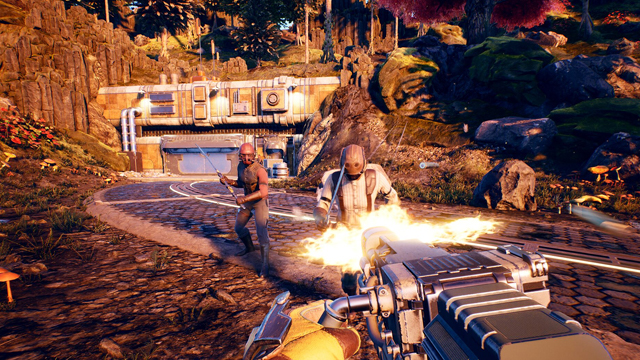
Of course, you don’t have to be as Lawful Good as Picard, and it often feels like The Outer Worlds doesn’t want you to be. During conversations, specialized dialog options will routinely present themselves if you have a high enough level in that particular skill. For instance, you may be able to lie about the disturbing fertilization methods used by a community leader, or you could intimidate a guard into stepping aside and allowing you entry into a restricted area. These present unique solutions to challenging problems, though it does feel like it’s far too easy to talk your way out of situations.
There is no downside to using one of these specialized dialog options, as they will always be successful if your skill level is high enough. Lying to someone, even if that person is a high-standing community member, won’t affect your faction reputation, and I never came across someone who responded to my intimidation methods by calling my bluff and attacking me. Given how many variables there are in The Outer Worlds’ quests, perhaps the addition of even more deviations from the common path presented would have been too much for Obsidian to implement. However, the lack of repercussions you face can be jarring after you’ve made a particularly cutting remark about someone who really didn’t deserve it.
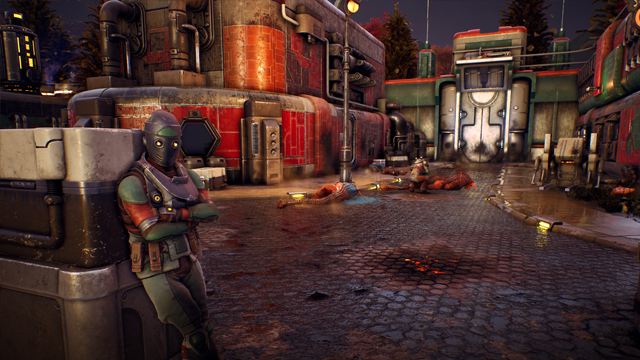
While this element of The Outer Worlds may be over-simplified, I found myself able to overlook it as a result of the impressive complexity of its branching dialog. In terms of the game’s bigger picture, every action has a suitable reaction and the consequences of my decisions were always logical, even if they were often grim. It’s difficult being the middle-man of a bunch of colonized alien planets, and while I attempted to toe the line between citizens and the looming presence of the Board, doing so while also operating in my own self-interest presented various moral quandaries. In different playthroughs I attempted different solutions, and the stark contrast between the outcome of these solutions was impressive.
A game with as much player-choice as The Outer Worlds has the potential to leave a slew of loose ends behind when the credits roll, but Obsidian ensures that everything is impacted as it should be in your wake. As a result, your decisions feel crucial and important, with you leaving a real impact on each location you visit — for better and for worse. When citizens say that word has got around about your misadventures, you believe them, and it’s suitably depressing to return to a town that you’ve tarnished only for its desperate citizens to start attacking you as soon as you enter the door.
The Outer Worlds Review | The Final Verdict
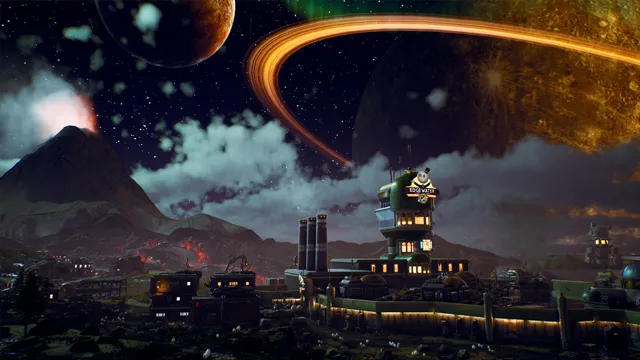
For over 40 hours, The Outer Worlds allowed me to be a space cowboy with all the adventure, intrigue, and danger that came along with it. Planet-hopping throughout Halcyon is one of the best experiences I’ve had in a game in years, introducing me to a cast of sympathetic and interesting characters, throwing me into exciting gunfights, and inundating me with tough decisions to make. This is a must-play for RPG fans, and an absolutely vital game for Fallout fans.
The Outer Worlds review code provided by publisher. Played for review on PS4 Pro.
-
Every action has a meaningful consequence.
-
Planets are gorgeous.
-
Tons of interesting characters to meet.
-
Well-polished with zero performance issues.
-
Combat is fast-paced and fun.
-
Companions make you feel like a real captain of a spaceship.
-
The Board are a looming threat, but don't provide a primary antagonist for much of the story.
-
Too easy to talk your way out of situations.
-
Lacking its own visual identity.
